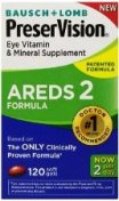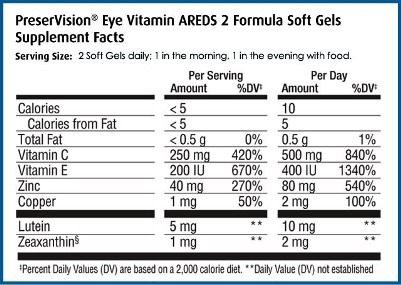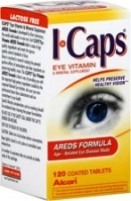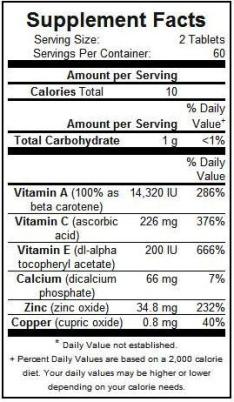
An American research group has concluded that claims made about top-selling eye vitamin brands and products in the United States lack concrete scientific evidence supported by clinical trial outcomes.
The researchers also determined that many of the most heavily promoted and top-selling products do not contain ingredients and dosages identical to “eye vitamin” formulas that have been proven effective in the Age-Related Eye Disease Studies (AREDS and AREDS2), sponsored by the National Eye Institute.
The study findings established that, of the eleven popular supplements analyzed in the study, seven did not adhere to clinically proven formulas and all eleven made misleading claims regarding prevention and effectiveness. There were no clear statements indicating that at present, there is no proven benefit in using “eye vitamin” supplements for the primary prevention of eye diseases, such as age-related macular degeneration and cataracts.
Ophthalmology: the Journal
The supporting research, entitled Ocular Nutritional Supplements: Are Their Ingredients and Manufacturers’ Claims Evidence-Based?, has been published online ahead-of-print on November 20, 2014 in Ophthalmology, the official journal of the American Academy of Ophthalmology. Ophthalmology publishes original, peer-reviewed research in ophthalmology, including new diagnostic and surgical techniques, the latest drug findings, and results of clinical trials.
The authors are Jennifer J. Yong, MD; Ingrid U. Scott, MD, MPH; and Paul B. Greenberg, MD, who represent the following institutions: Yale-New Haven Hospital-Waterbury Hospital, Waterbury, Connecticut; Penn State College of Medicine, Hershey, Pennsylvania; Providence VA Medical Center, Providence, Rhode Island; and the Warren Alpert Medical School of Brown University, Providence, Rhode Island.
The First Age-Related Eye Disease Study (AREDS)
The first Age-Related Eye Disease Study (AREDS) was a major clinical trial sponsored by the National Eye Institute to:
- Learn more about the history of, and risk factors for, age-related macular degeneration (AMD) and cataract;
- Evaluate the effect of high doses of antioxidants and zinc on the progression of AMD and cataract.
Results from the first AREDS trial, reported in October 2001, indicated that five years of supplementation with high doses of antioxidant vitamins, copper, and zinc reduced the risk of developing advanced AMD in 30% of individuals in the study who took the supplements and had already-existing moderate to advanced dry or wet AMD.
The original AREDS formulation included:
- 500 milligrams (mg) of vitamin C
- 400 international units of vitamin E
- 15 mg beta-carotene (for non-smokers only)
- 80 mg zinc as zinc oxide
- 2 mg copper as cupric oxide (to avoid anemia with high zinc intake)
The Second Age-Related Eye Disease Study (AREDS2)
In May 2013, The National Eye Institute concluded the Age-Related Eye Disease Study 2 (AREDS2), which tested several changes to the original AREDS formulation:
- The primary goal of the AREDS2 study was to determine if (a) adding omega-3 fatty acids or (b) lutein and zeaxanthin (the anti-oxidants found in dark green leafy vegetables) to the original AREDS formulation would make it more effective for reducing the risk of advanced AMD and cataract.
- The AREDS2 research group also substituted lutein and zeaxanthin for beta-carotene, which prior studies had associated with an increased risk of lung cancer in smokers.
The researchers concluded that while omega-3 fatty acids had no effect on the formulation, lutein and zeaxanthin together appeared to be a safe and effective alternative to beta-carotene. Therefore, the addition of lutein and zeaxanthin to – and the subtraction of beta carotene from – the original AREDS supplement formula were recommended by AREDS2.
The AREDS2 formulation now includes:
- 500 milligrams (mg) of vitamin C
- 400 international units of vitamin E
- 80 mg zinc as zinc oxide
- 2 mg copper as cupric oxide (to avoid anemia with high zinc intake)
- 10 mg lutein
- 2 mg zeaxanthin
A Cautionary Note, However
There is some new evidence that individuals whose AMD progression is slowed by the AREDS supplements were of a particular genetic makeup and that the supplements may speed AMD progression in those with a different genetic makeup.
This has prompted some scientists to call for genetic testing of everyone with macular degeneration before prescribing supplements, but the evidence is not sufficient for all scientists to agree on this. Individuals should discuss this with their own eye care specialists.
More about the Research
Excerpted from Top-selling eye vitamins found not to match scientific evidence, via Science Codex:
Research shows that, of 11 popular supplements analyzed, seven do not adhere to proven formulas; all 11 have misleading claims. Researchers have analyzed popular eye vitamins to determine whether their formulations and claims are consistent with scientific findings.
They determined that some of the top-selling products do not contain identical ingredient dosages to eye vitamin formulas proven effective in clinical trials. In addition, the study found that claims made on the products’ promotional materials lack scientific evidence.
To test whether the products are consistent with the studies’ findings, researchers compared the ingredients in top-selling brands to the exact formulas proven effective by AREDS and AREDS2. The researchers … identified the five top-selling brands based on market research collected from June 2011 to June 2012, and analyzed the brands’ 11 products.
They found that, while all of the products studied contained the ingredients from the AREDS or AREDS2 formulas:
- Only four of the products had equivalent doses of AREDS or AREDS2 ingredients.
- Another four of the products contained lower doses of all the AREDS or AREDS2 ingredients.
- Four of the products also included additional vitamins, minerals, and herbal extracts that are not part of the AREDS or AREDS2 formulas.
In addition, while all 11 of the products’ promotional materials contained claims that the supplements “support,” “protect,” “help,” or “promote” vision and eye health, none had statements specifying that nutritional supplements have only been proven effective in people with specific stages of AMD.
There were also no statements clarifying that currently there is not sufficient evidence to support the routine use of nutritional supplements for primary prevention of eye diseases such as AMD and cataracts.
Said author Jennifer J. Yong, MD, “Our findings underscore the importance of ophthalmologists educating patients that they should only take the proven combination of nutrients and doses for AMD according to guidelines established by AREDS and AREDS2. It’s also crucial that physicians remind patients that, at this time, vitamins have yet to be proven clinically effective in preventing the onset of eye diseases such as cataracts and AMD.”
A results table of the analyzed products (PDF file) is available online.
My Real-Life Examples
As a vision professional, I have long been interested in presenting accurate information about AREDS and AREDS2 supplements, including (a) the ingredients that have been proven effective in AREDS clinical trials and (b) the as-yet unproven ability of “eye vitamin” supplements to prevent the onset of AMD and cataracts.
As an example, I compared and contrasted the ingredient lists of Bausch + Lomb PreserVision Eye Vitamin and Mineral Supplement AREDS2 Formula and Alcon I-Caps Eye Vitamin and Mineral Supplement AREDS Formula (recommended for my mother).
Bausch + Lomb PreserVision AREDS2 Formula
PreserVision Supplement Facts

- Serving size: 1 soft gel
- Dosage: 2 per day
- Vitamin C: 500 mg
- Vitamin E: 400 IU
- Zinc: 80 mg
- Copper: 2 mg
- Lutein: 10 mg
- Zeaxanthin: 2 mg
Comparison: AREDS2 Recommendations
- Vitamin C: 500 mg
- Vitamin E: 400 IU
- Zinc: 80 mg
- Copper: 2 mg
- Lutein: 10 mg
- Zeaxanthin: 2 mg
Comparison Results
It’s a perfect match. See for yourself:

PreserVision Eye Vitamin AREDS2 Formula
Soft Gels Supplement Facts
Alcon I-Caps Eye Vitamin and Mineral Supplement AREDS Formula
I-Caps Supplement Facts

- Serving size: 2 tablets
- Dosage: 4 tablets per day
- Vitamin A: 28,640 IU
- Vitamin C: 452 mg
- Vitamin E: 400 IU
- Calcium: 120 mg
- Zinc: 69.6 mg
- Copper: 1.6 mg
Comparison: Original AREDS Recommendations
- Vitamin C: 500 mg
- Vitamin E: 400 IU
- Beta-Carotene: 15 mg
- Zinc: 80 mg
- Copper: 2 mg
Comparison: AREDS2 Recommendations
- Vitamin C: 500 mg
- Vitamin E: 400 IU
- Zinc: 80 mg
- Copper: 2 mg
- Lutein: 10 mg
- Zeaxanthin: 2 mg
Comparison Results
Not even close to either AREDS or AREDS2. See for yourself:

I-Cap Eye Vitamin and Mineral AREDS Formula Supplement Facts
Note: Values shown are for a two-tablet dosage.
Daily recommended dosage is 4 tablets.
A Summary of the Study Results from Ophthalmology
From the article abstract:
Purpose: To compare ingredients contained in top-selling brands of ocular nutritional supplements with the Age-Related Eye Disease Study (AREDS) and AREDS2 formulae and investigate the validity of claims made by manufacturers of leading brands of ocular nutritional supplements.
Methods: We examined the 5 top-selling brands of ocular nutritional supplements in the United States according to dollar sales tracked by SymphonyIRI (Waltham, MA) from June 2011 to June 2012. We reviewed the ingredients and manufacturer claims of 11 ocular nutritional supplements on the companies’ consumer information websites; the ingredients were compared with those contained in the AREDS and AREDS2 formulae.
Main Outcome Measures: Proportion of ocular nutritional supplements that contained the same ingredients, in the same doses, as the AREDS or AREDS2 formula; proportion of nutritional supplements with unsubstantiated claims made by the manufacturer.
Results: All of the ocular nutritional supplements contained the ingredients from the AREDS or AREDS2 formula; 36% (4/11) of the supplements contained equivalent doses of AREDS or AREDS2 ingredients; 55% (6/11) included some information about the AREDS on their consumer information websites.
Product descriptions from 4 of the 11 supplements (36%) stated that the supplements were important to maintain general eye health; none of these supplements duplicated the AREDS or AREDS2 formula. All the individual supplements claimed to “support,” “protect,” “help,” or “promote” vision and eye health, but none specified that there is no proven benefit in using nutritional supplements for primary prevention of eye disease.
The Study Conclusions and What You Can Do
The authors conclude that “The majority of top-selling ocular nutritional supplements did not contain the identical ingredient dosages of the AREDS or AREDS2 formula and had product description claims that lacked level 1 evidence, underscoring the importance of ophthalmologists educating their patients on the evidence-based role of nutritional supplements in the management of eye health.”
[Editor’s note: Level 1 evidence represents research results that address clinical outcomes and meet an extensive set of quality criteria which minimizes researcher bias.]
Talk with your ophthalmologist or optometrist to learn if you could benefit from taking AREDS2 supplements.